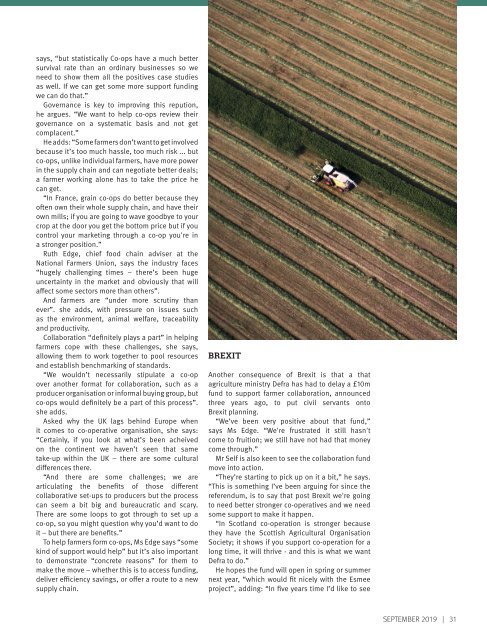Co-op News September 2019: Agriculture
How are co-ops working agriculture?
How are co-ops working agriculture?
Create successful ePaper yourself
Turn your PDF publications into a flip-book with our unique Google optimized e-Paper software.
says, “but statistically <strong>Co</strong>-<strong>op</strong>s have a much better<br />
survival rate than an ordinary businesses so we<br />
need to show them all the positives case studies<br />
as well. If we can get some more support funding<br />
we can do that.”<br />
Governance is key to improving this repution,<br />
he argues. “We want to help co-<strong>op</strong>s review their<br />
governance on a systematic basis and not get<br />
complacent.”<br />
He adds: “Some farmers don’t want to get involved<br />
because it’s too much hassle, too much risk ... but<br />
co-<strong>op</strong>s, unlike individual farmers, have more power<br />
in the supply chain and can negotiate better deals;<br />
a farmer working alone has to take the price he<br />
can get.<br />
“In France, grain co-<strong>op</strong>s do better because they<br />
often own their whole supply chain, and have their<br />
own mills; if you are going to wave goodbye to your<br />
cr<strong>op</strong> at the door you get the bottom price but if you<br />
control your marketing through a co-<strong>op</strong> you're in<br />
a stronger position.”<br />
Ruth Edge, chief food chain adviser at the<br />
National Farmers Union, says the industry faces<br />
“hugely challenging times – there’s been huge<br />
uncertainty in the market and obviously that will<br />
affect some sectors more than others”.<br />
And farmers are “under more scrutiny than<br />
ever”. she adds, with pressure on issues such<br />
as the environment, animal welfare, traceability<br />
and productivity.<br />
<strong>Co</strong>llaboration “definitely plays a part” in helping<br />
farmers c<strong>op</strong>e with these challenges, she says,<br />
allowing them to work together to pool resources<br />
and establish benchmarking of standards.<br />
“We wouldn’t necessarily stipulate a co-<strong>op</strong><br />
over another format for collaboration, such as a<br />
producer organisation or informal buying group, but<br />
co-<strong>op</strong>s would definitely be a part of this process”.<br />
she adds.<br />
Asked why the UK lags behind Eur<strong>op</strong>e when<br />
it comes to co-<strong>op</strong>erative organisation, she says:<br />
“Certainly, if you look at what’s been acheived<br />
on the continent we haven’t seen that same<br />
take-up within the UK – there are some cultural<br />
differences there.<br />
“And there are some challenges; we are<br />
articulating the benefits of those different<br />
collaborative set-ups to producers but the process<br />
can seem a bit big and bureaucratic and scary.<br />
There are some lo<strong>op</strong>s to got through to set up a<br />
co-<strong>op</strong>, so you might question why you’d want to do<br />
it – but there are benefits.”<br />
To help farmers form co-<strong>op</strong>s, Ms Edge says “some<br />
kind of support would help” but it’s also important<br />
to demonstrate “concrete reasons” for them to<br />
make the move – whether this is to access funding,<br />
deliver efficiency savings, or offer a route to a new<br />
supply chain.<br />
BREXIT<br />
Another consequence of Brexit is that a that<br />
agriculture ministry Defra has had to delay a £10m<br />
fund to support farmer collaboration, announced<br />
three years ago, to put civil servants onto<br />
Brexit planning.<br />
“We’ve been very positive about that fund,”<br />
says Ms Edge. “We're frustrated it still hasn't<br />
come to fruition; we still have not had that money<br />
come through.”<br />
Mr Self is also keen to see the collaboration fund<br />
move into action.<br />
“They’re starting to pick up on it a bit,” he says.<br />
“This is something I’ve been arguing for since the<br />
referendum, is to say that post Brexit we're going<br />
to need better stronger co-<strong>op</strong>eratives and we need<br />
some support to make it happen.<br />
“In Scotland co-<strong>op</strong>eration is stronger because<br />
they have the Scottish Agricultural Organisation<br />
Society; it shows if you support co-<strong>op</strong>eration for a<br />
long time, it will thrive - and this is what we want<br />
Defra to do.”<br />
He h<strong>op</strong>es the fund will <strong>op</strong>en in spring or summer<br />
next year, “which would fit nicely with the Esmee<br />
project”, adding: “In five years time I’d like to see<br />
SEPTEMBER <strong>2019</strong> | 31


















